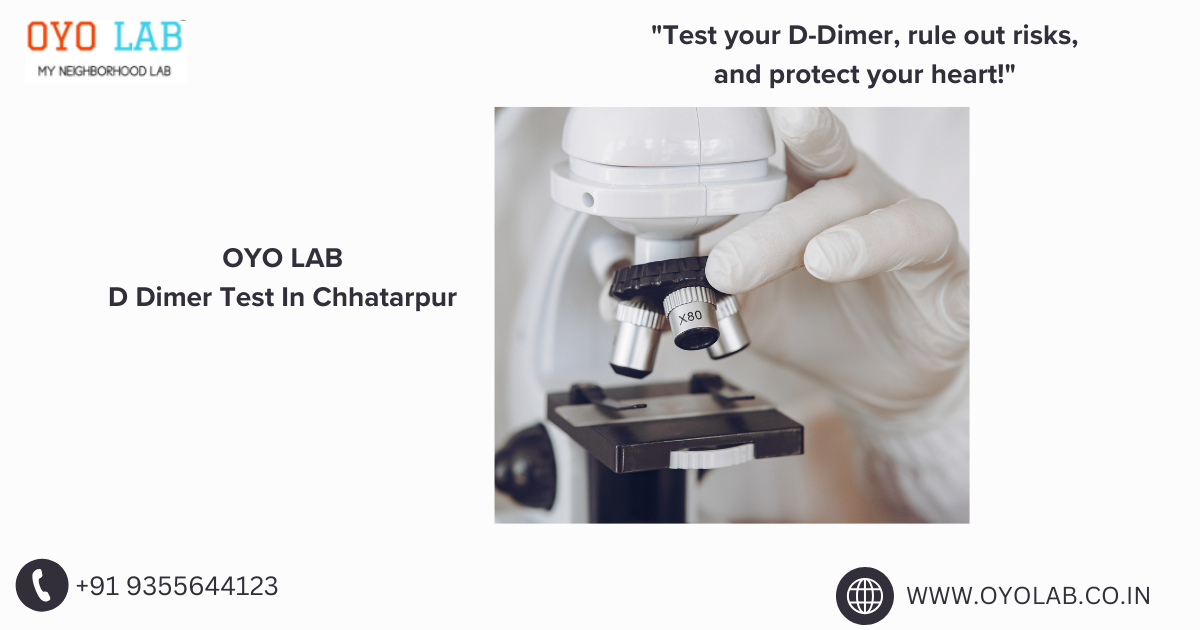
D Dimer Test In Chhatarpur
By Shilpa | March 07, 2025
What Is D Dimer Test ?
A D-Dimer Test is a blood test that helps detect blood clotting disorders. It measures D-Dimer, a protein fragment released when a blood clot dissolves in the body.
Why Is It Done?
Doctors order a D-Dimer test to check for conditions like:
✅ Deep Vein Thrombosis (DVT) – Blood clots in the legs.
✅ Pulmonary Embolism (PE) – A clot in the lungs.
✅ Disseminated Intravascular Coagulation (DIC) – A serious clotting disorder.
✅ Stroke or Heart Conditions – In some cases, to assess clot-related risks.
What Do the Results Mean?
- Normal (Low D-Dimer): Unlikely to have a serious clotting issue.
- High D-Dimer: May indicate a blood clot, but further tests (like ultrasound or CT scan) are needed for confirmation.
Importance Of D Dimer Test
The D-Dimer Test is crucial for detecting and ruling out serious blood clotting conditions. Here’s why it’s important:
1. Helps Detect Life-Threatening Blood Clots
- Identifies conditions like Deep Vein Thrombosis (DVT) and Pulmonary Embolism (PE), which can be fatal if untreated.
2. Aids in Diagnosing Disseminated Intravascular Coagulation (DIC)
- Helps detect DIC, a severe condition where excessive clotting and bleeding occur simultaneously.
3. Quick and Non-Invasive
- A simple blood test that provides rapid results, aiding in urgent medical decisions.
4. Helps Rule Out Blood Clots
- A negative (low) D-Dimer result can rule out DVT or PE, reducing the need for unnecessary imaging tests.
5. Assists in Stroke and Cardiovascular Risk Assessment
- High D-Dimer levels may indicate an increased risk of stroke, heart attack, or other cardiovascular issues.
6. Essential for High-Risk Patients
- Beneficial for individuals with recent surgery, prolonged immobility, pregnancy, or a history of clotting disorders.
Benefits Of D Dimer Test
The D-Dimer Test is a valuable tool in detecting and ruling out serious blood clot-related conditions. Here are its key benefits:
1. Early Detection of Blood Clots
- Helps identify Deep Vein Thrombosis (DVT) and Pulmonary Embolism (PE), preventing life-threatening complications.
2. Quick and Non-Invasive
- A simple blood test that provides fast results, aiding in urgent medical decisions.
3. Helps Rule Out Clotting Disorders
- A negative D-Dimer test can rule out blood clots, reducing the need for costly imaging tests like CT scans.
4. Assists in Diagnosing Disseminated Intravascular Coagulation (DIC)
- Helps detect DIC, a serious condition where excessive clotting leads to bleeding complications.
5. Useful for Stroke and Heart Disease Assessment
- High levels may indicate an increased risk of stroke, heart attack, or other cardiovascular issues.
6. Beneficial for High-Risk Patients
- Essential for individuals with recent surgery, pregnancy, prolonged immobility, or a history of clotting disorders.